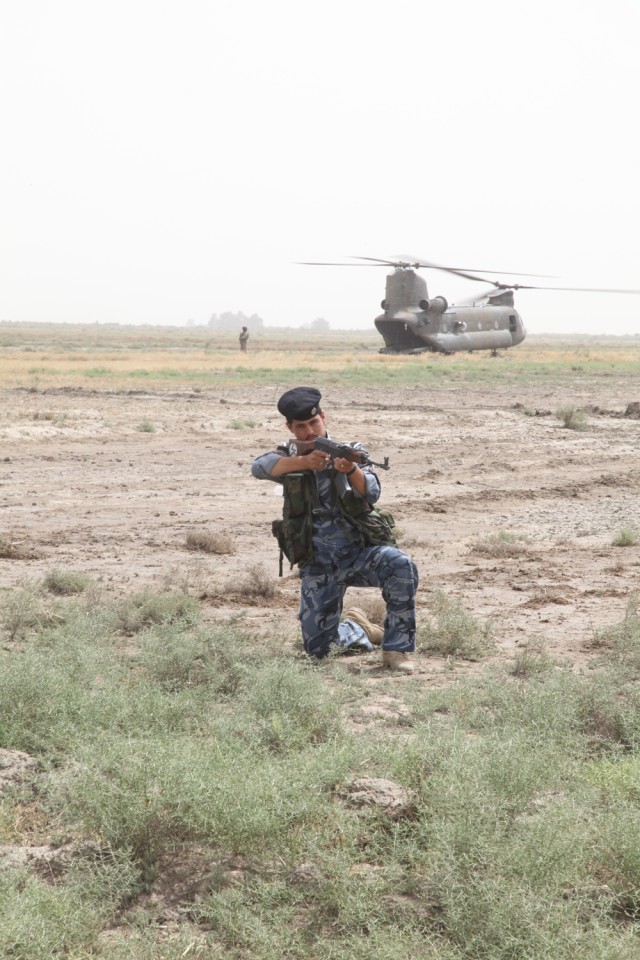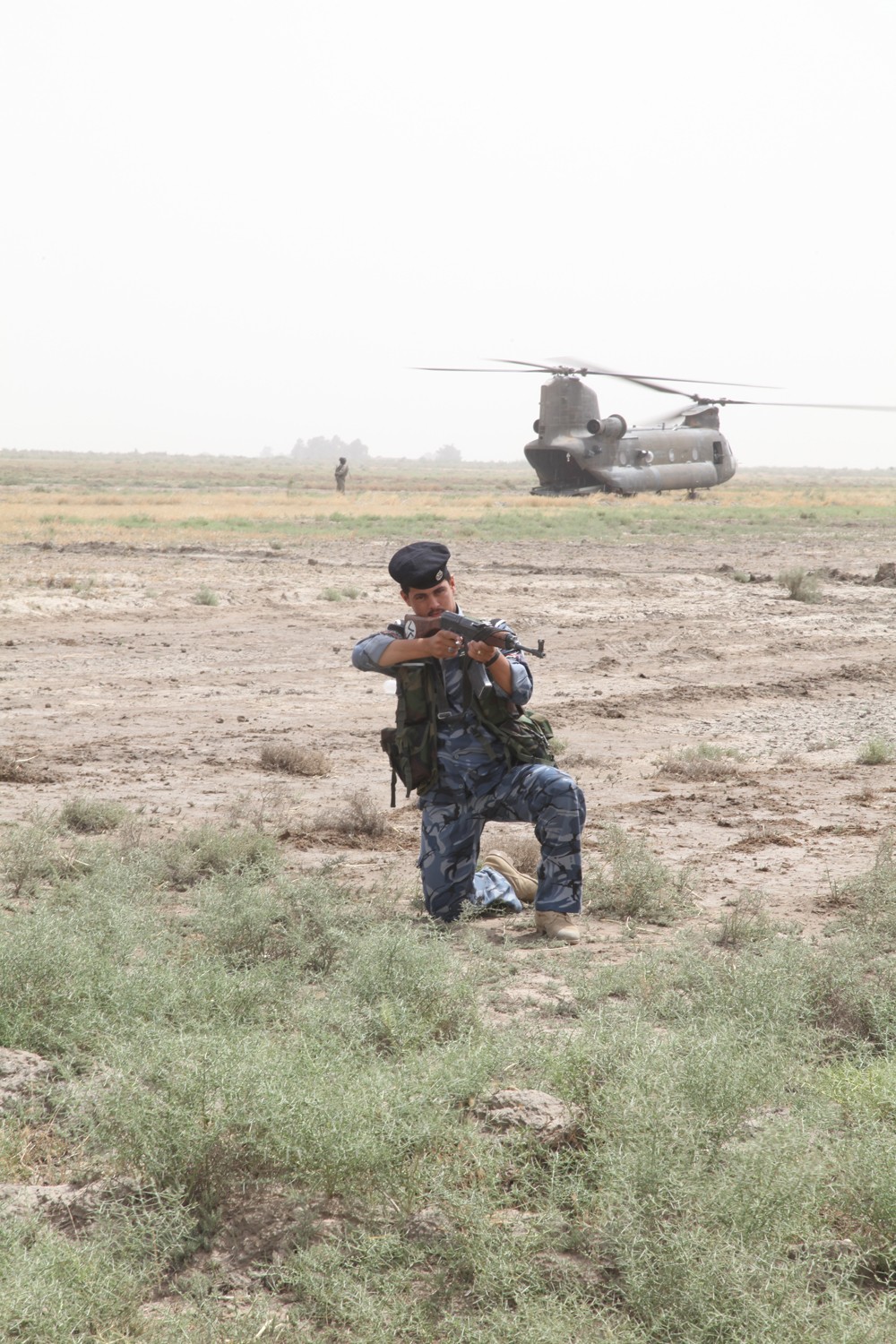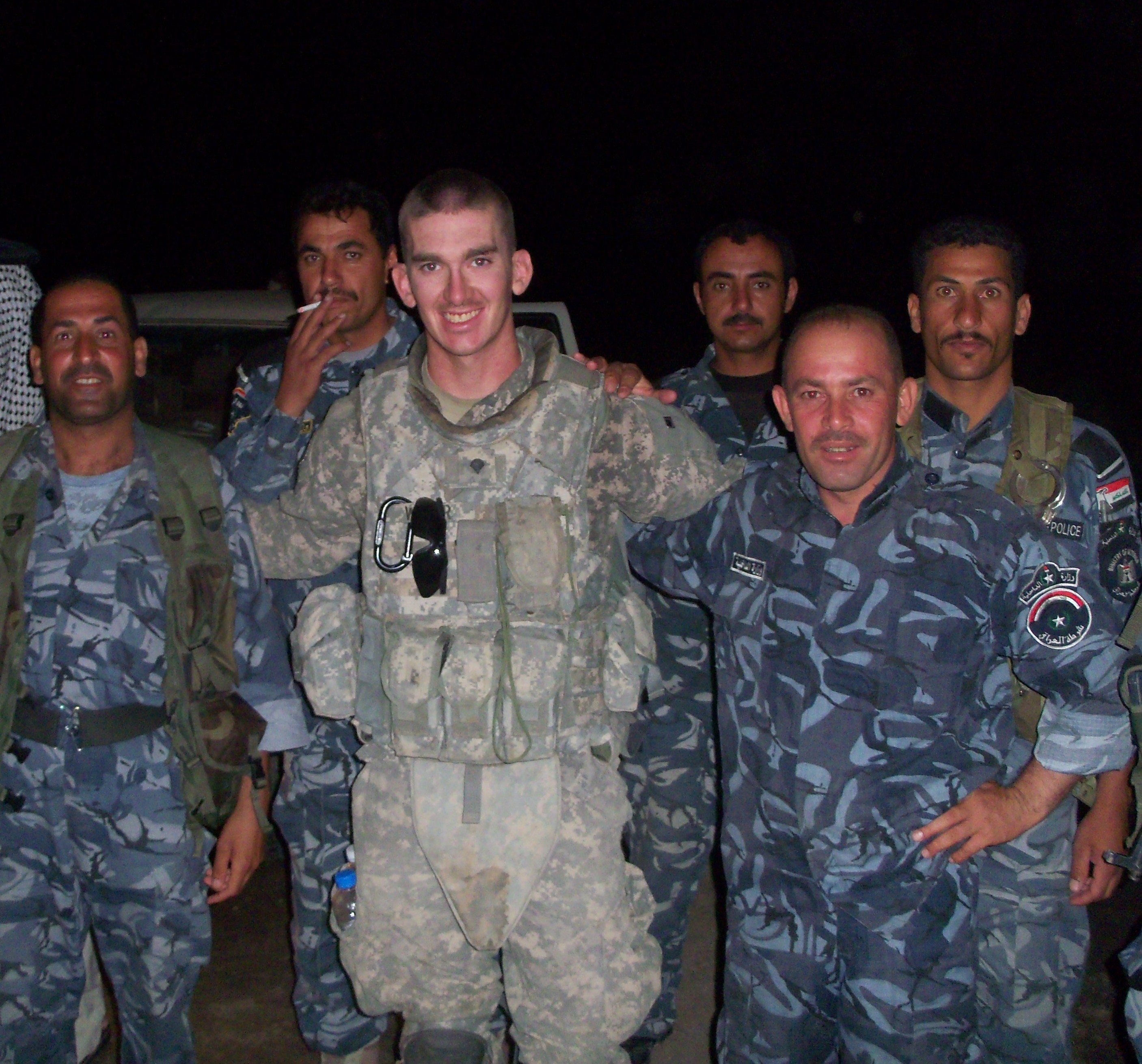A joint team of Iraqi Police from the 6th Emergency Response Unit and Soldiers from 3rd Brigade Combat Team, 4th Infantry Division, secured and recovered a disabled U.S. helicopter May 16, 2010, after it was forced to make an emergency landing the day before.
The 3-4 BCT is currently part of United States Division-South, which is commanded by the 1st Infantry Division.
The helicopter, a UH-60 Black Hawk assigned to the Company B, 2nd Battalion, 285th Aviation Regiment, stationed at Contingency Operating Base Adder, was on a routine passenger flight from Tallil Air Base to Contingency Operating Site Garry Owen when it was forced to land due to a mechanical problem.
The aircraft's crew safely set the helicopter down in a patch of farmland about 30 miles northeast of Nasiriyah, Iraq. The landing was non combat-related, and no Soldiers or civilians were injured.
A quick reaction force from Battery B, 3rd Battalion, 29th Field Artillery Regiment, 3rd BCT, 4th Inf. Div., stationed at Joint Security Station Jenkins, was alerted of the "downed" aircraft and scrambled to prepare their equipment and rehearse their battle drills, said Capt. Michael Scott, commander, Btry B, of Manassas, Va.
Scott said he was pleased with how his unit reacted after receiving the mission, noting that it took his quick reaction force only five minutes to load the two CH-47 Chinooks and depart for the landing site.
"As the Chinooks lifted off, I was running through all the contingencies in my head and trying to come up with what I needed to do first once we hit the LZ," said Staff Sgt. Wesley Sturdivant, cannon crew member from Colorado Springs, Colo.
Within an hour and a half of the disabled Black Hawk's landing, the 19-Soldier QRF arrived at the site and secured the area, said 1st Lt. Joseph Gratton, of Cincinnati, Ohio, 3rd platoon leader and QRF officer-in-charge for the mission.
At the request of U.S. forces in Dhi Qar, the Iraqi Police dispatched a team from the 6th ERU from Nasiriyah to assist in securing the landing site during the recovery.
The Iraqi forces arrived in 12 police vehicles just after 9 p.m., and immediately offered Gratton their help, he said. After Gratton asked for their assistance with perimeter security, he was quickly impressed by their professionalism.
"Once they got set in their security, they stayed at their positions the entire night," he said.
Having recently arrived in Iraq to assume the advise and assist mission, members of Gratton's "Black Platoon" were pleased by the eager assistance from their Iraqi partners.
"It was great to see such a combined effort and the IP's willingness to help with the security of our aircraft," said Sturdivant. "The IP leadership said that the Black Hawk was sort of like their Black Hawk now and they weren't going to let anything happen to it."
The highlight for the U.S. Soldiers was the surprise feast provided by the local village shaykh in the middle of the night. The shaykh brought 50 chickens and two newly-slaughtered lambs to feed both the Iraqi and U.S. forces. Several hours later, he brought out eggs, cheese and bread for breakfast, said Gratton.
"The best part of the entire mission was the impromptu feast. I never expected to be eating lamb with a bunch of IP's at the downed aircraft location," said Sgt. Ralph Froelich, cannon crew member of Abingdon, Ill.
At nearly midnight, a Down Aircraft Recovery Team arrived to assess the extent of the helicopter's mechanical problem.
"A DART usually includes a maintenance test pilot and other maintenance personnel who assess the damage to the aircraft," said Maj. Cameron Cashman, brigade aviation officer, 3rd BCT. "They will figure out if the aircraft can be fixed at its current location, needs to be sling-loaded out or be destroyed in place."
By 10 a.m. the next morning, the aircraft recovery team had repaired the Black Hawk and had begun flying it back to Tallil AB.
According to Gratton, the Iraqi police didn't leave the site to go back to Nasiriyah until the last helicopter had departed with the remaining Soldiers and equipment.
For the soldiers of Black Platoon, the whole experience served as a tremendous morale booster they will remember for a long time, said Gratton.
"I knew this was something new and didn't really know what to expect at the downed helicopter's position," said Spc. Chad Weber, cannon crew member, from Lubbock, Texas. All of the Soldiers in Black Platoon handled the initial mission changes well and everyone stayed calm and focused on the mission, he said.




Social Sharing